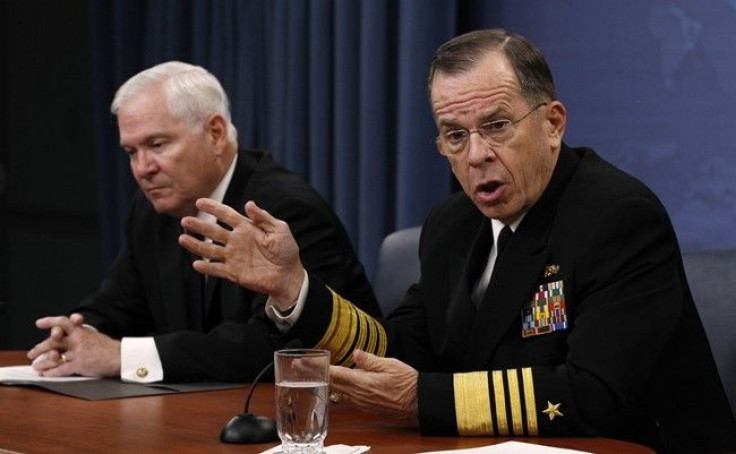Risk from 'don't ask' repeal low, says U.S. military report

A U.S. military report issued Tuesday found the risk of repealing the Don't Ask, Don't Tell policy to overall military effectiveness is low.
The policy, first put into place in 1993, conditionally allows gays and lesbians to remain employed in the service, while requiring their silence about their homosexuality.
We conclude that, while a repeal of Don't Ask, Don't Tell will likely, in the short term, bring about some limited and isolated disruption to unit cohesion and retention, we do not believe this disruption will be widespread or long-lasting, and can be adequately addressed by the recommendations we offer below, said a joint statement in the report by Department of Defense General Counsel Jeh Johnson and U.S. Army General Carter Ham.
The report comes more than 10 months after the Department of Defense began studying the issues associated with implementing a repeal of the policy, should Congress decided to do so.
Part of the report included a survey of military service members. About 28 percent of military personnel, or 115,000 of 400,000, answered the survey. The margin of error was plus or minus one percent, according the report. There were nearly 100 questions in the survey, with many of those having related questions.
We did not poll the military or conduct a referendum on the overall question of whether to repeal the current Don't Ask Don't Tell law and policy, the report stated. That was not our mission, nor are military policy decisions made by referendum of Service members. Our primary mission was to assess the impact of a repeal, should it occur, to military readiness, military effectiveness, unit cohesion, recruiting, retention, and family readiness.
The survey found differences in the way soldiers saw their personal readiness and immediate unit's readiness being affected by the potential change.
Survey question 75a found 60 percent of service members said there would be no effect in their personal readiness if the policy was repealed and the service member was working with someone in the immediate unit who said he or she is gay or lesbian.
However in question 75b, when the survey asked how the repeal would affect the immediate unit's readiness, just over 46 percent said it would have no effect.
When asked in question 68a how the change would affect how Service members in your mediate unit work together to get the job done, the survey found 6.6 percent said it would be affected very positively, 11.8 percent said positively, 32.1 percent equally as positively as negatively, 18.7 percent said negatively, 10.9 percent said very negatively, and 19.9 percent said there would be no effect.
A panel of lawmakers on the Senate Armed Services Committee are expected to hold hearings on the released report.
The head of the committee, Sen. Carl Levin, D-MI, said last month he expects the hearings would be a boost toward passing the National Defense Authorization Act, the bill to which the DADT repeal is attached.
However, the top Republican on the committee says his focus will be on discussing the policy, not implementing a possible repeal.
I want to know the effect on battle effectiveness and morale, not on how best to implement a change in policy, Sen. John McCain, R-AZ, said in a televised interview over the weekend.
McCain said in February, when the report was still in the planning stages, that numerous military leaders told him the policy is working, and that we should not change it now. I agree.
Supporters of the repeal include Defense Secretary Robert Gates and the chairman of the Joint Chiefs of Staff Adm. Mike Mullen, both of whom reiterated their support for the repeal on Tuesday.
Proponents of the repeal are urging the lame duck Congress to enact the policy change before the new Congress takes its seat in January.
Senate Majority Leader Harry Reid, D-NV, vowed on November 17 to hold votes on the repeal during the lame duck session.
© Copyright IBTimes 2024. All rights reserved.











